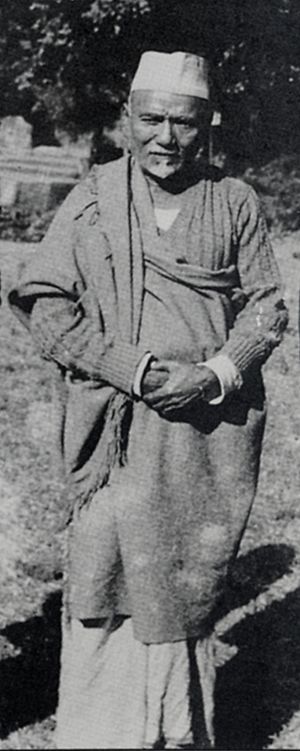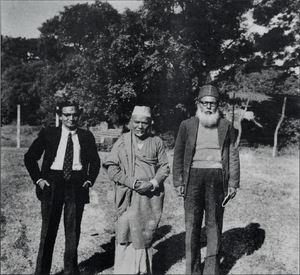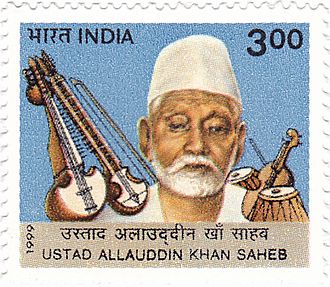Allauddin Khan facts for kids
Quick facts for kids
Allauddin Khan
|
|
|---|---|

Khan at Burdwan House in Dhaka in 1955
|
|
| Background information | |
| Born | c. 1862 – c. 10 Shibpur, Bengal Presidency, British India (now Bangladesh) |
| Died | 6 September 1972 (aged 109–110) |
| Genres | Hindustani classical music |
| Occupation(s) | Composer, sarodiya |
| Instruments | Shehnai, sarod, sitar, bansuri |
Allauddin Khan, also known as Baba Allauddin Khan (born October 8, 1862 – died September 6, 1972), was a very famous Indian musician. He played the sarod and many other instruments. He was also a composer and one of the most important music teachers of the 20th century in Indian classical music. People called him "Baba," which means "father" or "respected elder."
Contents
Early Life and Learning Music
Khan was born in a village called Shibpur, which is now in Bangladesh. His father, Sabdar Hossain Khan, was also a musician. Allauddin Khan learned his first music lessons from his older brother, Fakir Aftabuddin Khan.
When he was about ten years old, Khan ran away from home. He joined a jatra party, which is a type of folk theater group. This allowed him to experience many different kinds of folk music.
Khan later went to Kolkata, a big city. There, he met a doctor named Kedarnath. Kedarnath helped him become a student of Gopal Krishna Bhattacharya, a well-known musician. Khan spent twelve years practicing music under his guidance.
After his teacher passed away, Khan started focusing on playing instruments. He learned to play many instruments like the sitar, flute, mandolin, and banjo. He also learned traditional Indian drums like the pakhawaj and tabla.
Career as a Musician
Allauddin Khan became the main musician for the Maharaja (king) of Maihar State. In Maihar, he created a new style of music called the Maihar gharana. He also developed new musical melodies called ragas. He even combined traditional instruments with newer ones to create an orchestra.
In 1935, he traveled to Europe with a dance group led by Uday Shankar. He also taught at Uday Shankar's music center for a while. In 1955, Khan started a music college in Maihar. Some of his music was recorded by All India Radio in 1959 and 1960.
Awards and Honors
Khan received many high honors for his contributions to music. In 1958, he was given the Padma Bhushan. In 1971, he received the Padma Vibhushan. These are two of India's highest awards for civilians.
Before that, in 1954, the Sangeet Natak Akademi gave him its top award. This was the Sangeet Natak Akademi Fellowship. It recognized his amazing lifetime work in Indian music.
His Musical Family and Students
Allauddin Khan had a huge impact on music. His son, Ali Akbar Khan, and his daughter, Annapurna Devi, became famous musicians. His nephew, Raja Hossain Khan, and grandson, Aashish Khan, also followed in his musical footsteps.
Many other talented musicians were his students. Some of his most famous students include Ravi Shankar and Nikhil Banerjee. He taught them with great care and strictness. His students often said that he was tough, but it was because he wanted them to become the best musicians they could be.
Khan's house in Maihar has been restored. It is now part of a place where artists and writers can come to work.
Personal Life
People tell many stories about Allauddin Khan. He was known for being very dedicated to his students. He was also kind to those in need, like helping disabled beggars. His strict teaching style was meant to make sure his students learned well and became disciplined. He believed that being too soft would not help them grow as musicians.
Films About Allauddin Khan
- Ustad Alauddin Khan (1963), a documentary film.
- Baba Alauddin Khan (1965), another documentary film.
- Raga (1971), a film that was re-released in 2010.
- Maihar Raag (1993), a film that won an award in 1994.
See Also
- Maihar gharana
 | Frances Mary Albrier |
 | Whitney Young |
 | Muhammad Ali |



